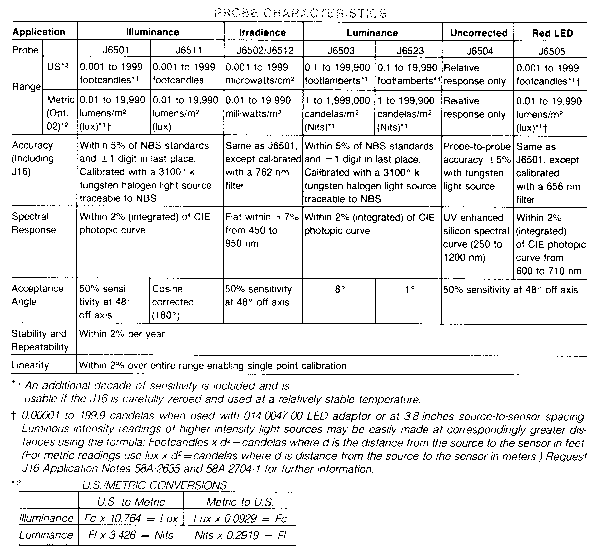Photometer/Radiometer J16
Tektronix; Portland, OR
- País
- Estados Unidos
- Fabricante / Marca
- Tektronix; Portland, OR
- Año
- 1973
- Categoría
- Aparato de medida y servicio (Equipo de laboratorio).
- Radiomuseum.org ID
- 246435
- Numero de transistores
- Hay semiconductores.
- Semiconductores
- Tensión de funcionamiento
- Bateria recargable / 7.6 Volt
- Altavoz
- - - No hay salida de sonido.
- Material
- Metálico
- de Radiomuseum.org
- Modelo: Photometer/Radiometer J16 - Tektronix; Portland, OR
- Forma
- Sobremesa de cualquier forma, detalles no conocidos.
- Ancho, altura, profundidad
- 123 x 60 x 203 mm / 4.8 x 2.4 x 8 inch
- Anotaciones
-
Th J16 is a portable digital photometer/radiometer capable of making variety of light measurement.
3 1/2 digit LED readout
Stability: Within 2% per year
Linearity: Within 2% over the entire range, enable single point calibration
Power Requirements: Internal rechargeable NiCd batteries
Suitable Probe: Tektronix Irradiance Probe J6502
- Peso neto
- 1.5 kg / 3 lb 4.9 oz (3.304 lb)
- Mencionado en
- - - Manufacturers Literature
- Autor
- Modelo creado por Pius Steiner. Ver en "Modificar Ficha" los participantes posteriores.
- Otros modelos
-
Donde encontrará 388 modelos, 376 con imágenes y 92 con esquemas.
Ir al listado general de Tektronix; Portland, OR
Colecciones
El modelo Photometer/Radiometer es parte de las colecciones de los siguientes miembros.
Contribuciones en el Foro acerca de este modelo: Tektronix; Portland,: Photometer/Radiometer J16
Hilos: 1 | Mensajes: 1
GLOSSARY
Photometry
The measurement of light visible to the human eye.
Radiometry
The measurement of light within the total optical spectrum.
Color Temperature
The temperature of a blackbody whose radiation has the same visible color as that of a given non-blackbody radiator. Usually expressed in °k.
Foot-candle
Unit of incident illumination.
Foot-lambert
A unit of illumination emitted or diffusely reelected by a source. Two additional units are commonly used:
the lux (the metric unit of illuminance) and
the nit (the metric unit of luminance).
1 foot-candle = 10.76 lux
1 foot-lambert = 3.426 nits
Illuminance
The amount of luminous flux through a unit of surface area and is usually measured in foot-candles (lumens/ft2).
Inverse Square Law
The decrease of light intensity with increasing distance. Twice the distance, reduces the illumination to one-quarter.
Irradiance
The amount of radiant flux received by a unit of surface area and is usually measured in watts/cm2 *.
* Other units of irradiance such as uW/cm2 and W/m2 are also used extensively.
Lambert's Law
Describes the spatial characteristics of a perfectly diffusing surface which may be either emitting or reflecting light. The light emitted or accepted by such a surface decreases with angle (from perpendicular) according to the cosine of the angle.
Luminance
The amount of light emitted or scattered by a surface and is usually measured in foot-lamberts.
Photopic
Spectral (color) sensitivity of the average human eye, predominantly peaked in the yellow-green region.
Steradian
A unit of area on the surface of a sphere equal to the radius squared. There are 12.6 steradians total area on a sphere.
Spatial
The directional characteristics of light in space.
Spectral
The distribution of light by wavelength within an electromagnetic spectrum.
Note that each radiometric unit has a photometric equivalent differing only in spectral response of the sensor. However, the units are not interchangeable.
PROBE CHARACTERISTICS
for probes: J6501 J6511 J6502/J6512 J6503 J6523 J6504 J6505
Source: Tektronix Catalog 1986
Anexos
- US_Tek_J16_ProbeCharacteristics (71 KB)
- US_Tek_J16_SensorDiagram (34 KB)
Pius Steiner, 03.Jan.14


